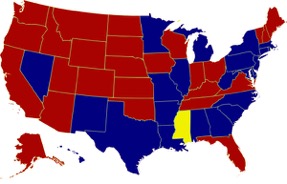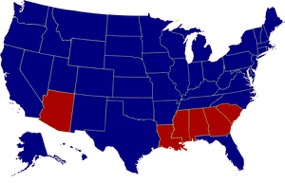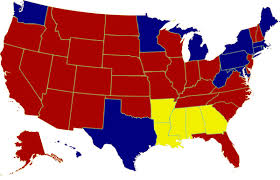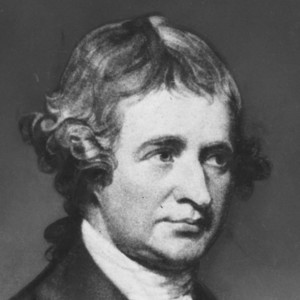Although they are admittedly rare at Berkeley, there is a handful of Republicans in my classes, visible mostly from their spirited advocacy of Friedrich von Hayek, Milton Friedman, Ayn Rand and others. The ideas of these thinkers do not trouble me. We know where these ideas came from, how they were composed, their coherence, and their attraction. They hold a significant place in social history. What troubles me is not the ideas per se, but their association with republicanism. For nothing is more certain but that none of these thinkers is republican in any intellectually defensible sense.
Historically we can account for the transformation of the US Republican Party from a party of wealth and privilege that eschewed the crowd and faulted the Democratic Party for its crude pandering and demagoguery to a Party built almost entirely upon precisely such crude pandering and demagoguery. When in the 1950s the Democratic Party decisively turned its back on its southern Democratic cousins, making a clean break with their Jim Crow, and when it appeared, for this very reason, that the Democratic Party had a lock on the two houses of Congress, at least, if not on the White House, Republican strategists began to reframe the Party’s image as the party of the common man, small government, free enterprise. In its famous “southern strategy,” the party of Abraham Lincoln cynically courted the southern racist vote, thus turning the tables on more than a century of political wisdom (compare 1960, 1964, and 1968 voting maps below).



Since institutions often change their plans to fit new circumstances, no one should be particularly surprised by this strategic shift. Remember, well into Franklin Delano Roosevelt’s tenure, the Democratic Party was perfectly happy to turn a blind eye to its southern, cross-burning, lynching brothers and sisters so long as they lent their support to the New Deal. It took the Great Depression, the Second World War, and Civil Rights to bring the Democratic Party to change its own tune from “Dixie” to “We Shall Overcome.” No, what troubles me is when this strategic shift begins to reshape the capacity of students to grasp some of the most basic themes of history. So it is that the radical character of republican values and institutions has become virtually inaccessible to most if not all students today.
Happily, in the case of republicanism its intellectual pedigree appears on its very face: res publica, the wealth we share in common, or, in English, commonwealth. The same, obviously, is true for the Democratic Party, which, ever since its birth in classical Greece, has floated a mathematical truism, 51>49, for a moral and political imperative. No one doubts that 51 is more than 49. But why is 51 better than 49? In the case of republicanism, however, the very core of their newly minted ideological center is anti-republican. Edmund Burke, whose Reflections on the French Revolution (1790) is on the lips if not on the shelves of every thinking Republican, was, in fact, an anti-republican. Thomas Paine was a democrat and anti-republican. So, too, were Patrick Henry, Samuel Adams, and Robert Yates, co-authors of the Anti-Federalist Papers, composed in opposition to the US Constitution, outspoken democrats all, but today placed front and center in the Republican pantheon.
The confusion surrounding so clear and distinct an idea as res publica gave me an idea: a republican reader, a collection of classic republican writings. Such a reader would, of course, begin with Aristotle. It would include Livy, Plutarch, and Cicero. Would it also include Machiavelli? Thomas More? Jean Jacques Rousseau is an obvious choice as are Alexander Hamilton, James Madison, and John Jay. But, what about GWF Hegel’s “Civil Society,” a masterpiece if there ever was one on republican institutions? And, obviously, Abraham Lincoln. But should we also include Lincoln’s leading continental admirer, Karl Marx? And what about Theodore Roosevelt whose creation of the national parks system we celebrate this year, but whose support of republican values and institutions has earned him the ire of nearly every contemporary (anti-)Republican?

A republican reader might also help us to tease apart the fierce hostility between two of contemporary (anti-)Republican’s icons: Edmund Burke, on the one hand, and Thomas Paine, on the other. Paine it might be recalled was tried and convicted in abstentia for his attacks on Edmund Burke, and yet both the outspoken critic and the defender of the French Revolution enjoy beatification among contemporary (anti-)Republicans. How can that be? The answer, actually, is not too difficult to grasp. What contemporary (anti-)Republicans like about Paine is his least republican quality, his advocacy of democratic institutions, not his fierce opposition to private wealth (which they conveniently overlook). Here they turn to Burke’s defense of private wealth and privilege, which, again, is a most unrepublican trait. Finally, Paine’s opposition to the federalists seals the deal, so to speak. For, when the federalists met in Philadelphia to hammer out (the second) US Constitution, the hall was virtually emptied of any but the most withering anti-federalist opinion.

Landed wealth’s party in Philadelphia was represented by the southern delegates who only conceded federalism reluctantly and even then only in exchange for the noxious 3/5ths clause, which allowed them, for purposes of representation, to count their property (their slaves) within the formula for representation in the House. Obviously by 1861 this compromise no longer satisfied the interests of landed wealth in the south. In the balance, however, Paine’s defense of state’s rights, of local and state over central government, explains his attraction for contemporary (anti-)Republicans. Whether Paine recognized at the time that this made him a defender of landed southern wealth and slavery is unclear. What is clear is that the wedding contemporary (anti-)Republicans have forged between Paine and Burke, the common thread that holds them together, however tenuously, is their hostility to “the wealth we hold in common,” the commonwealth, or res publica.
No one (I think) would mistake the elitism of Ayn Rand or the free market ideology of Friedrich von Hayek or Milton Friedman for the republicanism of Aristotle, Rousseau, Hamilton, Hegel, Lincoln or Roosevelt. Those who today take the name of “Republican” embrace an ideology diametrically opposed to historical republicanism, which, of course, assuming they have any interest in it, they vehemently oppose. (No one is lining up today to praise Teddy Roosevelt’s national parks or Abe Lincoln’s expansion of voting rights.) It is after all, just a name. Institutionally, however, the Republican Party stands in opposition to everything historical republicanism affirms, beginning with “the wealth we hold in common.” However, it does not end there. Where historical republicanism was hostile to political power resting on private wealth — hostile, that is, to monarch and nobility — the Republican Party defends the political right of private wealth. In this, its lineage to Edmund Burke, the fierce opponent of republicanism, is much clearer. Likewise, their fondness for Ayn Rand and for her elitism is diametrically opposed to republican values and institutions. (Yes to meritocracy; no to plutocracy.)
Nevertheless, it is not too difficult to trace the connection between the one and the other. Against all historical and empirical evidence, von Hayek and Friedman came to be convinced that by eliminating all social and institutional constraints on capital, communities would unbind the decision-making powers of consumers/citizens. Poor historians all, these free market fundamentalists completely overlooked the vast institutional, legal, and social framework that beginning in the fourteenth century imposed markets on Europeans. They also conveniently ignored the reams of transcripts from the US Constitutional convention and hundreds of shelves of books devoted to those transcripts showing how thoroughly federalist and republican was the “original intent” of the US Constitution. Instead, turning a blind eye to all historical evidence, they seized upon the attractive romantic fiction that freedom is composed by the absence of constraint. Liberate markets and freedom will prevail. This, of course, was also the ideology of southern landowners who deeply disliked sending their hard-earned capital upstream to Philadelphia or New York to support res publica. Indeed, were it not for their fears that northerners would not honor their property rights and contracts and would not muster militias to help put down slave uprisings, there is little question but that southern landholders had no interest in supporting public institutions at all. The absence of constraint would have served them quite well. Von Hayek, Friedman, and Rand are useful tools of private, not public wealth, because they defend a notion of freedom hostile to institutional constraints. Otherwise, one cannot imagine any thinkers more hostile to republicanism than von Hayek, Friedman, or Rand.
As a final note, if we cast a glance back on our three maps, we will note that this wedding of Paine and Burke holds the key to grasping their significance: angry, poor, white men affiliating with landed gentry who promise to protect them from an overreaching central government. What the landed wealthy neglected to tell the angry, poor, white men is that they have no intention whatsoever in sharing their wealth. They are actually both anti-republicans and anti-democrats. Paine for them is simply a useful fiction, again.
